 Somehow each year, summer solstice sneaks up on me. Sure, the days get extraordinarily long here in the Northern Rockies, and sure everything is greening up fast. I have two goat kids who are now almost four weeks old, and yeah, the warmer weather is upon us. Still, I end up feeling unprepared for the solstice.
Somehow each year, summer solstice sneaks up on me. Sure, the days get extraordinarily long here in the Northern Rockies, and sure everything is greening up fast. I have two goat kids who are now almost four weeks old, and yeah, the warmer weather is upon us. Still, I end up feeling unprepared for the solstice.
Shaking Off Skadi’s Powers
Skadi reigns much of the time here in the Northern Rockies. That being said, Thor, Freyr, Freyja, and Baldr take hold around now. I heard Thor’s voice this week, announcing his arrival. Freyr and Freyja show their might as new life appears. Animals’ offspring follow them out of thickets and dens; the forests take on a lush green. The time for renewal is at hand.
Warning: Science!
In a scientific sense, the summer solstice is simply the time when our planet’s tilt is closest to the sun. Imagine our planet is a toy top that has been set in motion. At some point in the spin, the top begins to tilt and wobble as it slows down. That is what our planet is doing right now.

We know that millions of years ago, our days were shorter because our planet was spinning faster. As our planet’s spin slows, our days grow longer by 1.8 milliseconds a century. Eventually that will add up to more noticeably longer days, but certainly not in our lifetime, nor in the lifetimes of our children, grandchildren, or even great-grandchildren.
It’s this small tilt that makes it possible for us to have four seasons. When our side of the hemisphere is tilted away from the sun, we have winter. When it is tilted toward the sun, we have summer. It is the furthest tilt that brings us the solstices.
If you don’t find it simply amazing that something so slight as a small wobble could affect life on our planet, there’s something wrong with you. That feels like magic, plain and simple, even if it is science.
Thanks to the Gods for the Solstices
I can’t help but think that these happy coincidences which brought life to flourish on our planet were part of the gods’ plans. I’m willing to accept the science, and yet, the coincidences are astonishing.
Think about it. We live on a planet that basically won the lottery when it came to supporting life. Even if you’re not a creationist-type person, you have to admit we lucked out. Our gods have set in motion an amazing world, and we are damn lucky to have it. We’re damn fortunate to be here, given all the times our species has nearly gone extinct.
Understanding the Solstices as a Threshold
The summer solstice is a threshold of sorts. I’ve heard the term “liminal” used to describe certain parts of the year. The summer solstice is the longest day of the year, but at the same time, it heralds the loss of light until the winter solstice.
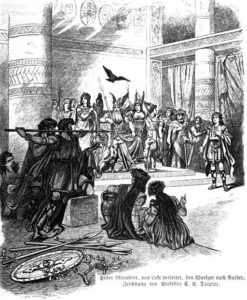 I think of the story about Baldr and Hodr. Baldr is made impervious to all things except the mistletoe. Loki gives Hodr a spear made from mistletoe and helps Hodr aim it. We think of Baldr as the sun on summer solstice. His blind brother, Hodr, is the oncoming darkness of winter. Each year, Hodr “slays” Baldr, but Baldr is eventually resurrected to shine once more.
I think of the story about Baldr and Hodr. Baldr is made impervious to all things except the mistletoe. Loki gives Hodr a spear made from mistletoe and helps Hodr aim it. We think of Baldr as the sun on summer solstice. His blind brother, Hodr, is the oncoming darkness of winter. Each year, Hodr “slays” Baldr, but Baldr is eventually resurrected to shine once more.
The solstices mark when the days are the longest, and when they are the shortest. After the summer solstice, we begin our march towards winter. The sunlight retreats until the winter solstice, when it returns again.
Celebrating the Summer Solstice
As Heathens, the solstices are our holy days. During the summer solstice, we thank the gods for the light and for our growing season. We ask for health and good harvests, even if we no longer have anything to do with farming. We celebrate our families and friends.
I find there is plenty to celebrate when it comes to the solstice. We may have dealt with some pretty shitty things in our lives, but we have to be among the living to still be here. The wonder that is our life is still amazing, and there is still plenty to learn and experience in this world.
Our Renewal with the Summer Solstice
Nowadays, people are pretty jaded when it comes to our seasons. Sure, people enjoy the warm weather, but there isn’t a lot of joy in the seasons, themselves. There certainly isn’t a lot of  wonder in them–we know what causes the seasons. At some point, people only look forward to the seasons as times for doing human activities, and not just marveling at the season, itself.
wonder in them–we know what causes the seasons. At some point, people only look forward to the seasons as times for doing human activities, and not just marveling at the season, itself.
Think about it. I doubt seriously most people sit and just meditate on summer when the summer solstice passes. You might, and maybe your heathen and pagan friends do, but most people just don’t. And yet, the summer solstice is a time for renewal. That includes renewing yourself as a heathen.
No matter how old you are, you can take part in that renewal. It can be as short as a few minutes, or as long as you feel is necessary. And yeah, it’s a type of magic, I suppose. You’re going to get in touch with the landvaetr, the gods, and the ancestors.
How to Renew Yourself During the Summer Solstice, and Beyond…
 Summer solstice is a time to thank the gods, the landvaetr, and the ancestors for everything. You may wish to have some mead or other offering to leave at your outdoor altar. If you don’t have an outdoor altar, you can choose a favorite tree outside. Whatever your offering is, be sure it is biodegradable and not poisonous to wildlife and pets.
Summer solstice is a time to thank the gods, the landvaetr, and the ancestors for everything. You may wish to have some mead or other offering to leave at your outdoor altar. If you don’t have an outdoor altar, you can choose a favorite tree outside. Whatever your offering is, be sure it is biodegradable and not poisonous to wildlife and pets.
- Start by sitting comfortably outside, preferably in a forest, park, or other place within nature. You can sit in a chair, on a bench, on a rock or log, or even on the ground, if you so choose. Close your eyes, or keep your eyes open. Doesn’t matter.
- Take deep breaths through your nose, and exhale through your mouth. Let your mind still as you breath in this fashion, and focus on relaxing each muscle group as you do.
- As you relax, you may notice your environment. Is it hot and sunny, or is it cool? Is there a breeze? What does the air feel like? What about where you are sitting? Are you comfortable, or do you feel uncomfortable because the ground is wet, insects are buzzing around you, or something is poking you in the butt?
- What do you smell on the breeze? Sure, you may get the smells of the city, but can you smell the flowers nearby? What do the trees smell like? Do you get an earthy scent from the moss and wet ground nearby? Does the air have a taste? Acrid from the city, or does it taste like the flowers nearby? Sharp like a pine tree? Woodsy like an oak tree?
- What do you hear? Sure, you may hear traffic and people, but is there a bird singing nearby? What does the leaves sound like when the breeze rustles through it? Do you hear the snort of a deer, or maybe the barking of a dog? Maybe the chittering of a squirrel.
- Open your eyes, if they aren’t already open. What do you see? Try to not take in everything, but focus on something natural: a flower, a tree, a river or stream, a mountain top, or maybe the ocean. Some may be too big or too small to focus on. That’s okay. Just move from one natural thing to another, if you’re not focusing.
- Look up and Sunna and thank her for the warmth of the first day of summer. Thank Baldr for the beauty of the sun at summer solstice. Thank Mani for the solstice moon.
- Thank Freyr and Freyja for the new life around you, whether it’s animals, plants, or even human babies.
- Thank Thor and Sif for the rains and the harvest that is to come. Ask for our farmers’ prosperity and a bountiful harvest.
- Thank whichever gods you wish to honor at this time.
- Thank the landvaetr for their tireless care over the land you sit on.
- Thank your ancestors, for without them, there would be no you to enjoy the moment.
- Pour an offering (or leave an offering) on your outdoor altar, or at the place you designated.
- Spend as much time as you’d like (or as much time as you’re permitted) enjoying the solstice.
Other Fun Ways to Celebrate the Solstice
I have another post on Five Ways Heathens can Celebrate the Summer Solstice. Check it out.
—
Thank you Sarra Keene for your support on Patreon. Without you, I would have a hard time keeping this blog going!
Did you know you can become my patron for as little as $5 a month? This entitles you to content not posted anywhere else. Plus you get to see posts like this three days before the public! Without patrons, I’d be having a very hard time keeping this blog going. Become a patron today! Become a Patron!
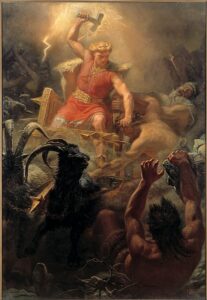 Thor is one of the most popular Norse gods, renowned for his superhuman strength and courage. An Aesir, Thor is the god of thunder, lightning, and storms. He is a major figure in Norse mythology, appearing in several forms, including in the Prose Edda, the Heimskringla, and the sagas of Icelanders.
Thor is one of the most popular Norse gods, renowned for his superhuman strength and courage. An Aesir, Thor is the god of thunder, lightning, and storms. He is a major figure in Norse mythology, appearing in several forms, including in the Prose Edda, the Heimskringla, and the sagas of Icelanders.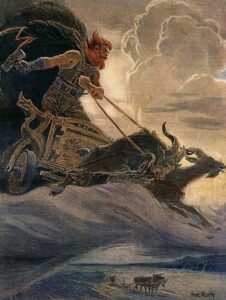 Thor’s chariot is pulled by two magical goats, Tanngnjostr and Tanngrisnir. These magical goats pull the chariot through the sky and carry him wherever he wished. Thor would summon the goats with Mjöllnir and they would pull him and his chariot, allowing him to travel across the nine realms. According to legend, after a journey Thor would kill the goats and eat them, but the next day they would be magically restored to life.
Thor’s chariot is pulled by two magical goats, Tanngnjostr and Tanngrisnir. These magical goats pull the chariot through the sky and carry him wherever he wished. Thor would summon the goats with Mjöllnir and they would pull him and his chariot, allowing him to travel across the nine realms. According to legend, after a journey Thor would kill the goats and eat them, but the next day they would be magically restored to life.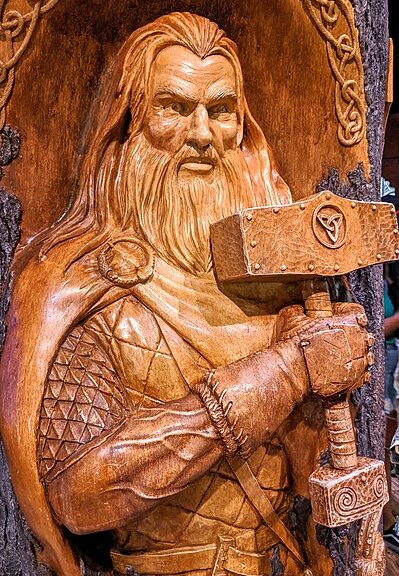
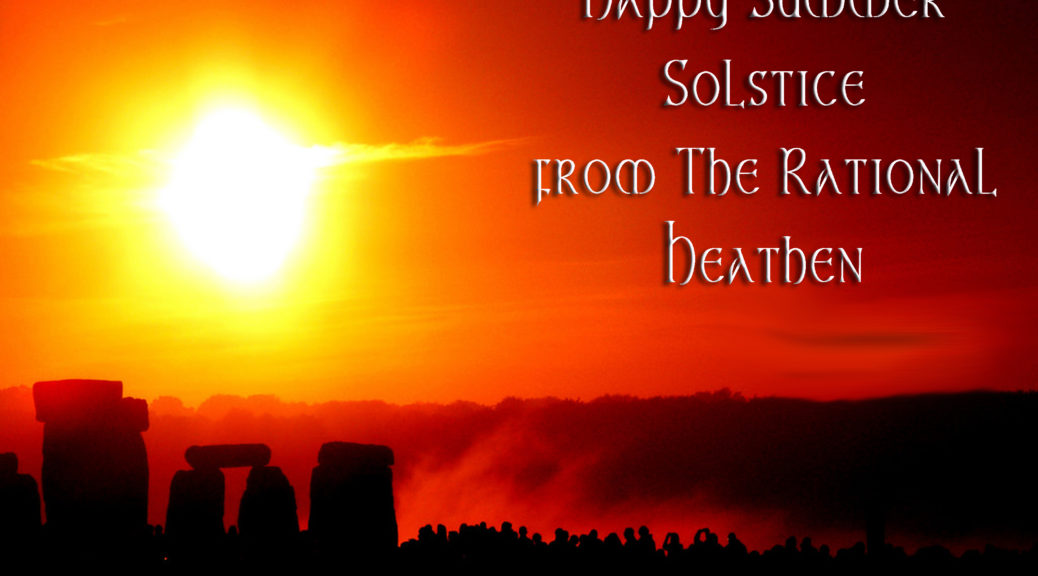
 Somehow each year, summer solstice sneaks up on me. Sure, the days get extraordinarily long here in the Northern Rockies, and sure everything is greening up fast. I have two goat kids who are now almost four weeks old, and yeah, the warmer weather is upon us. Still, I end up feeling unprepared for the solstice.
Somehow each year, summer solstice sneaks up on me. Sure, the days get extraordinarily long here in the Northern Rockies, and sure everything is greening up fast. I have two goat kids who are now almost four weeks old, and yeah, the warmer weather is upon us. Still, I end up feeling unprepared for the solstice.
 I think of the story
I think of the story  wonder in them–we know what causes the seasons. At some point, people only look forward to the seasons as times for doing human activities, and not just marveling at the season, itself.
wonder in them–we know what causes the seasons. At some point, people only look forward to the seasons as times for doing human activities, and not just marveling at the season, itself. Summer solstice is a time to thank the gods, the landvaetr, and the ancestors for everything. You may wish to have some mead or other offering to leave at your outdoor altar. If you don’t have an outdoor altar, you can choose a favorite tree outside. Whatever your offering is, be sure it is biodegradable and not poisonous to wildlife and pets.
Summer solstice is a time to thank the gods, the landvaetr, and the ancestors for everything. You may wish to have some mead or other offering to leave at your outdoor altar. If you don’t have an outdoor altar, you can choose a favorite tree outside. Whatever your offering is, be sure it is biodegradable and not poisonous to wildlife and pets.
 I intentionally used the Christian Hell, because I doubt strongly Lady Hel would treat humans this badly. 2021 is shaping up to be as awful as 2020 in a lot of respects. Sure it’s a new year, and we have the vaccine, but it’s going to take a shitload of inoculations before we can truly think this pandemic nightmare is finally over. Assuming the vaccine does what it’s supposed to do.
I intentionally used the Christian Hell, because I doubt strongly Lady Hel would treat humans this badly. 2021 is shaping up to be as awful as 2020 in a lot of respects. Sure it’s a new year, and we have the vaccine, but it’s going to take a shitload of inoculations before we can truly think this pandemic nightmare is finally over. Assuming the vaccine does what it’s supposed to do. When it suits the gods, I sometimes hear from them. Despite my connection to them, I try very hard not to put words in their mouths. Different gods have different agendas. Even so, I do get impressions and feeling from them. And the message I get is to survive. Yes. Survive. You, me, …everyone. Use our brains to understand what is happening and listen to those who know more about it than we do. That means, listen to medical and health professionals who have more knowledge than your neighbor, your favorite politician, or your favorite conspiracy website. Even I don’t have the answers to everything, but I will tell you how I see it. Too many people are quick to go back to “normal” living when most of the population isn’t vaccinated, and we really don’t know how long the vaccine is effective.
When it suits the gods, I sometimes hear from them. Despite my connection to them, I try very hard not to put words in their mouths. Different gods have different agendas. Even so, I do get impressions and feeling from them. And the message I get is to survive. Yes. Survive. You, me, …everyone. Use our brains to understand what is happening and listen to those who know more about it than we do. That means, listen to medical and health professionals who have more knowledge than your neighbor, your favorite politician, or your favorite conspiracy website. Even I don’t have the answers to everything, but I will tell you how I see it. Too many people are quick to go back to “normal” living when most of the population isn’t vaccinated, and we really don’t know how long the vaccine is effective. I get it. It’s been a tough year sheltering in place. But guys, we have it easy comparatively speaking, to our ancestors. Our medical professionals tell us to wear masks, stay at home when not doing anything that is vitally essential, and social distance when we’re in places with other people. Yeah, the virus has screwed with our jobs and our livelihoods; I get that. Kids can’t socialize and play with others. Yeah, I get that too. Suddenly parents have had to become parents again and deal with their family on the full-time basis. Not always easy.
I get it. It’s been a tough year sheltering in place. But guys, we have it easy comparatively speaking, to our ancestors. Our medical professionals tell us to wear masks, stay at home when not doing anything that is vitally essential, and social distance when we’re in places with other people. Yeah, the virus has screwed with our jobs and our livelihoods; I get that. Kids can’t socialize and play with others. Yeah, I get that too. Suddenly parents have had to become parents again and deal with their family on the full-time basis. Not always easy. All that being said, I’ve been horrified that our behavior as a species hasn’t changed since the last pandemic. And how we haven’t changed that much since diseases such as the plague have ravaged our populations. Different accounts have shown that people’s behavior is still pretty much the same in a crisis. Despite all the progress in science we’ve made, people are still quick to trust in their god or gods that they will be spared despite our knowledge and education. Or they go about blaming conspiracies by certain mistrusted groups. Or they make shit up and try that to protect themselves.
All that being said, I’ve been horrified that our behavior as a species hasn’t changed since the last pandemic. And how we haven’t changed that much since diseases such as the plague have ravaged our populations. Different accounts have shown that people’s behavior is still pretty much the same in a crisis. Despite all the progress in science we’ve made, people are still quick to trust in their god or gods that they will be spared despite our knowledge and education. Or they go about blaming conspiracies by certain mistrusted groups. Or they make shit up and try that to protect themselves. Okay, this is for those early birds who can get up and greet the new day. Or, for those of us who are night owls, who stay up long enough to see dawn break. The rest of you mere mortals will probably be a bit bleary-eyed for this. Even so, prepare a blot and offer it to Sunna, the wights, the ancestors, and to the gods and goddesses of summer.
Okay, this is for those early birds who can get up and greet the new day. Or, for those of us who are night owls, who stay up long enough to see dawn break. The rest of you mere mortals will probably be a bit bleary-eyed for this. Even so, prepare a blot and offer it to Sunna, the wights, the ancestors, and to the gods and goddesses of summer.
 The best way to celebrate the summer solstice is to get outdoors and do something that helps you enjoy the long daylight. This includes simple things like taking a walk, going hiking, going fishing, or doing some type of activity that involves getting outdoors. With COVID-19, remember to keep your distance from people who are not in your household, and to wear masks if you’re heading somewhere people are present.
The best way to celebrate the summer solstice is to get outdoors and do something that helps you enjoy the long daylight. This includes simple things like taking a walk, going hiking, going fishing, or doing some type of activity that involves getting outdoors. With COVID-19, remember to keep your distance from people who are not in your household, and to wear masks if you’re heading somewhere people are present. You do have a garden, don’t you? Even if it’s only a few herb pots or flowers, give them extra care today. Summer solstice is the longest day of the year when photosynthesis is at its peak due to all that sun. Even if it’s cloudy, the daylight provides extra time for growth.
You do have a garden, don’t you? Even if it’s only a few herb pots or flowers, give them extra care today. Summer solstice is the longest day of the year when photosynthesis is at its peak due to all that sun. Even if it’s cloudy, the daylight provides extra time for growth.


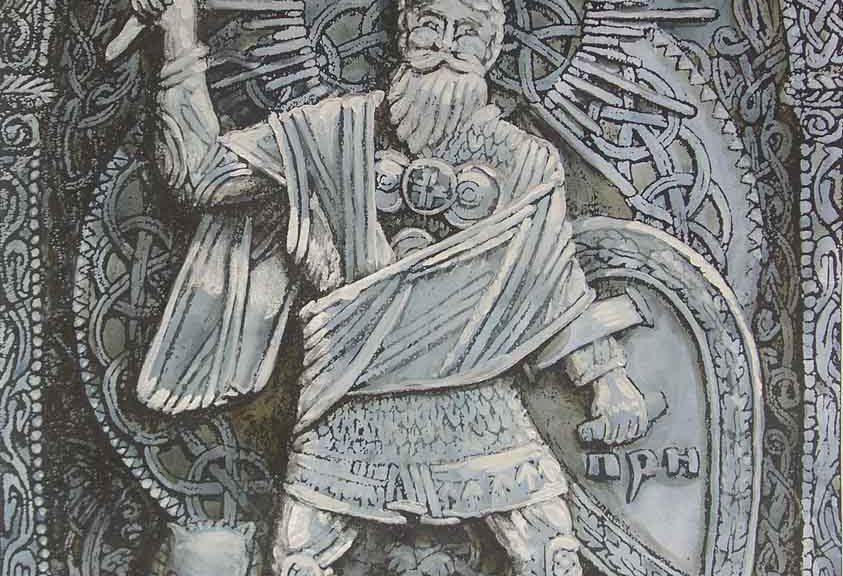
 I think I have another god I need to consider. Skadi, Tyr, Loki, Freyja, Freyr, Frau Holle, Odin, and yes, Thor, are all gods and goddesses have had my attention for some time. But recently, there’s been a shift and I’m starting to learn more about Perun, the Slavic god of Thunder. And oddly, he feels more familiar to me than Thor.
I think I have another god I need to consider. Skadi, Tyr, Loki, Freyja, Freyr, Frau Holle, Odin, and yes, Thor, are all gods and goddesses have had my attention for some time. But recently, there’s been a shift and I’m starting to learn more about Perun, the Slavic god of Thunder. And oddly, he feels more familiar to me than Thor. On first blush, Perun is a lot like Thor. He wields an axe or a hammer; a goat pulls his chariot. His hammer or axe returns to him after he has thrown it. He wields lightning and thunder. His beard is copper and he is incredibly strong. Like the Norse and Germanic gods, the Slavs look at the universe as a World Tree. At the roots is a dragon or serpent which Perun will fight.
On first blush, Perun is a lot like Thor. He wields an axe or a hammer; a goat pulls his chariot. His hammer or axe returns to him after he has thrown it. He wields lightning and thunder. His beard is copper and he is incredibly strong. Like the Norse and Germanic gods, the Slavs look at the universe as a World Tree. At the roots is a dragon or serpent which Perun will fight.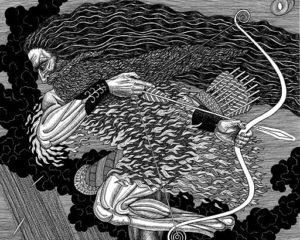 steals Perun’s cattle, children, or wife in an effort to provoke him. The story goes that Veles hides from Perun and when Perun sees Veles, he throws a thunderbolt. Only Veles escapes. Hence the reason lightning strikes seemingly harmless places.
steals Perun’s cattle, children, or wife in an effort to provoke him. The story goes that Veles hides from Perun and when Perun sees Veles, he throws a thunderbolt. Only Veles escapes. Hence the reason lightning strikes seemingly harmless places.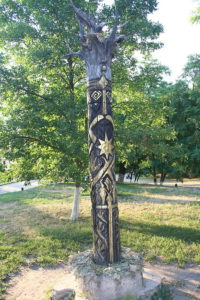 The
The 
 Quick, without Googling, name five Heathen gods or goddesses other than Odin, Thor, Freyja, Loki, or Hel. Now, assuming you didn’t cheat, can you tell me whether they’re Aesir, Vanir, Alfar, or Jotunn? (Again without Googling.)
Quick, without Googling, name five Heathen gods or goddesses other than Odin, Thor, Freyja, Loki, or Hel. Now, assuming you didn’t cheat, can you tell me whether they’re Aesir, Vanir, Alfar, or Jotunn? (Again without Googling.) The other day, I was talking to an agnostic on Facebook (yeah, you know who you are) who quizzed me about being a real Heathen. I wasn’t really bothered by it, but it got me to thinking about the Neo-Heathens who have joined Heathenry from watching pop culture movies and TV shows about Vikings and the gods. (Marvel springs to mind.) I also started thinking about the tendency for certain people in our religion to declare themselves gatekeepers or Asa-popes. Inevitably, there’s a clash between the Asa-popes and the neo-Heathens, because the Asa-popes and Gatekeepers are annoyed with the neophytes. They are annoyed that someone would show interest in our religion because of some pop culture reference.
The other day, I was talking to an agnostic on Facebook (yeah, you know who you are) who quizzed me about being a real Heathen. I wasn’t really bothered by it, but it got me to thinking about the Neo-Heathens who have joined Heathenry from watching pop culture movies and TV shows about Vikings and the gods. (Marvel springs to mind.) I also started thinking about the tendency for certain people in our religion to declare themselves gatekeepers or Asa-popes. Inevitably, there’s a clash between the Asa-popes and the neo-Heathens, because the Asa-popes and Gatekeepers are annoyed with the neophytes. They are annoyed that someone would show interest in our religion because of some pop culture reference. That would all be well and good, except Heathens are pretty much a drop in the overall pagan pool. We don’t have the numbers to turn anyone legitimately seeking knowledge away. (Except the neo Nazis, whom we really don’t want.) Heathenry and all its forms (with the exception of the white supremacists) might equal 250,000 in the world. If that.
That would all be well and good, except Heathens are pretty much a drop in the overall pagan pool. We don’t have the numbers to turn anyone legitimately seeking knowledge away. (Except the neo Nazis, whom we really don’t want.) Heathenry and all its forms (with the exception of the white supremacists) might equal 250,000 in the world. If that. My point is that people back then didn’t have a single view of the gods. Like now, they chose their own traditions and their own gods to believe in. The concept of organized religion occurred with the growth of cities and with priesthoods looking to grab power and keep themselves within the power structure. Sure, you had shamans and whatnot doing the power thing if you were in a tribe, but I suspect most Heathens revered ancestors and tutelary spirits, with an occasional major god or goddess thrown in for good measure.
My point is that people back then didn’t have a single view of the gods. Like now, they chose their own traditions and their own gods to believe in. The concept of organized religion occurred with the growth of cities and with priesthoods looking to grab power and keep themselves within the power structure. Sure, you had shamans and whatnot doing the power thing if you were in a tribe, but I suspect most Heathens revered ancestors and tutelary spirits, with an occasional major god or goddess thrown in for good measure.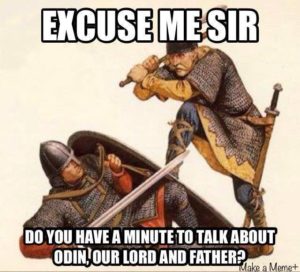 came to what kind of gods you worshiped was probably your own business and really not worried about, as long as you weren’t a dickhead about it. You were pretty much considered a Heathen if you believed in the Heathen gods–as far as we know, you didn’t get singled out because you believed that Thor was better than Odin, or you worshiped Perun or Frau Holle. Hel, our ancestors probably gave you a pass if you revered Loki as long as you were part of the kindred. When you started identifying with Christian ideals that were aimed at destroying Heathenism, that’s when they got a bit tetchy about it.
came to what kind of gods you worshiped was probably your own business and really not worried about, as long as you weren’t a dickhead about it. You were pretty much considered a Heathen if you believed in the Heathen gods–as far as we know, you didn’t get singled out because you believed that Thor was better than Odin, or you worshiped Perun or Frau Holle. Hel, our ancestors probably gave you a pass if you revered Loki as long as you were part of the kindred. When you started identifying with Christian ideals that were aimed at destroying Heathenism, that’s when they got a bit tetchy about it. What About Pop Culture Heathens?
What About Pop Culture Heathens?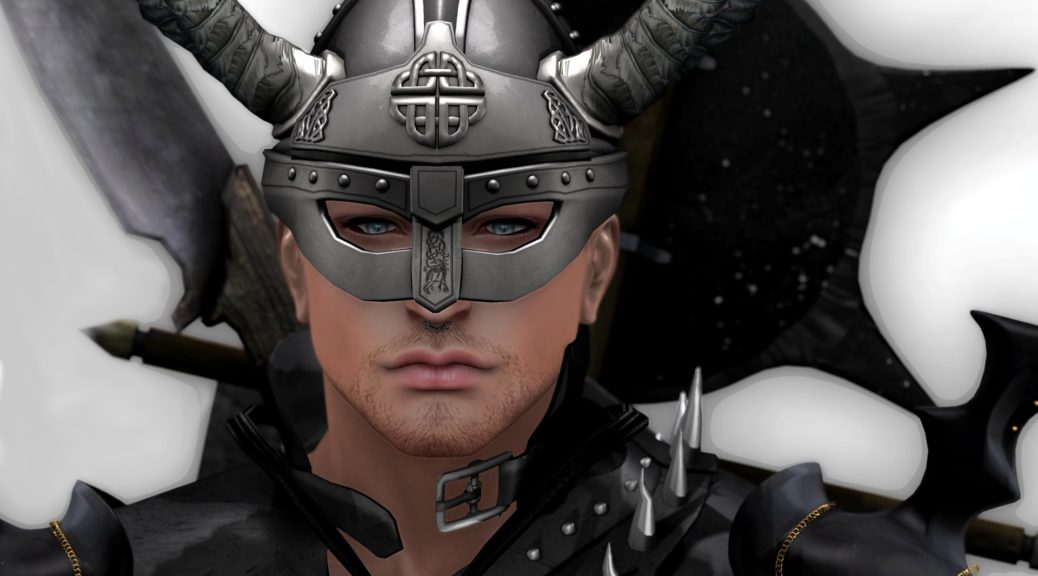
 I ran into an interesting post on Patheos entitled
I ran into an interesting post on Patheos entitled  they discriminated on religious beliefs, class, and political alliances. So if you were a Viking from Scandinavia who believed in the Heathen gods,
they discriminated on religious beliefs, class, and political alliances. So if you were a Viking from Scandinavia who believed in the Heathen gods,  You know, it’s okay to be introduced to the Heathen gods through Marvel, but if you’re becoming a Heathen because you find Tom Hiddleston or Chris Hemsworth sexy, maybe what you’re looking for isn’t a religion but a fan club. You shouldn’t worship Loki because you’re enamored with Hiddleston. Believe me, you aren’t the only one coming into the Northern religions because of the movies. The rest of us who are serious are going to sigh in disgust. We’re not a place for you to live out your fantasies when it comes to actors, so you might as well go someplace else.
You know, it’s okay to be introduced to the Heathen gods through Marvel, but if you’re becoming a Heathen because you find Tom Hiddleston or Chris Hemsworth sexy, maybe what you’re looking for isn’t a religion but a fan club. You shouldn’t worship Loki because you’re enamored with Hiddleston. Believe me, you aren’t the only one coming into the Northern religions because of the movies. The rest of us who are serious are going to sigh in disgust. We’re not a place for you to live out your fantasies when it comes to actors, so you might as well go someplace else. So, if you’re an alcoholic, or a borderline alcoholic, who wants to use Heathenry as an excuse to drink, go to rehab. Seriously. We need people who have their wits about them and not people who use Heathenry as an excuse to drink.
So, if you’re an alcoholic, or a borderline alcoholic, who wants to use Heathenry as an excuse to drink, go to rehab. Seriously. We need people who have their wits about them and not people who use Heathenry as an excuse to drink. I’m probably going to step on toes here, but if you’re using Heathenry just to dress up in cool clothing and armor, swing swords and carry medieval weapons, maybe you need to either be in an reenactment group or the SCA and not a Heathen. Certainly there are Heathens in reenactment groups and the SCA, and there’s no reason why they shouldn’t be there. The problem is when those people don’t take their Heathen beliefs seriously. Look, I get that there are atheist and agnostic Heathens out there, but they still take their lore seriously (maybe a little too seriously for my taste). No, I’m not saying that you need to become a recon asshat who insists that everything be done according to their (or some Asa-pope’s) interpretation of what the ancestors did, but at least you’re interested in the archaeology, lore, Eddas, writing, and the past.
I’m probably going to step on toes here, but if you’re using Heathenry just to dress up in cool clothing and armor, swing swords and carry medieval weapons, maybe you need to either be in an reenactment group or the SCA and not a Heathen. Certainly there are Heathens in reenactment groups and the SCA, and there’s no reason why they shouldn’t be there. The problem is when those people don’t take their Heathen beliefs seriously. Look, I get that there are atheist and agnostic Heathens out there, but they still take their lore seriously (maybe a little too seriously for my taste). No, I’m not saying that you need to become a recon asshat who insists that everything be done according to their (or some Asa-pope’s) interpretation of what the ancestors did, but at least you’re interested in the archaeology, lore, Eddas, writing, and the past.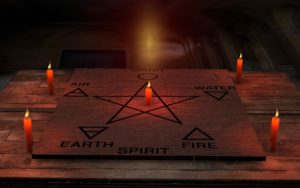 on this.) Heathenry has a limited amount of magic — we have seidr, we have runes, we have gods and giants, we have wights and other supernatural critters, we have berserkers and ulfhednar and whatnot. We have our own lore and magic that surrounds it. That being said, if you’re really looking for playing with magic a lot, you need to check out other pagan beliefs, most notably, Wiccan. It’s not that most Heathens wouldn’t welcome you into the fold; it’s just that you’ll be disappointed with Heathenry because we really don’t have what you’re looking for. Other pagan beliefs have more magical tendencies. The Heathen magic is usually communicating with wights and gods, being possessed by a supernatural entity, foretelling the future, wards, and making requests to entities in the form of blots. I’m not saying you can’t become powerful in your own right, but in many cases, you’ll find the magic somewhat lacking.
on this.) Heathenry has a limited amount of magic — we have seidr, we have runes, we have gods and giants, we have wights and other supernatural critters, we have berserkers and ulfhednar and whatnot. We have our own lore and magic that surrounds it. That being said, if you’re really looking for playing with magic a lot, you need to check out other pagan beliefs, most notably, Wiccan. It’s not that most Heathens wouldn’t welcome you into the fold; it’s just that you’ll be disappointed with Heathenry because we really don’t have what you’re looking for. Other pagan beliefs have more magical tendencies. The Heathen magic is usually communicating with wights and gods, being possessed by a supernatural entity, foretelling the future, wards, and making requests to entities in the form of blots. I’m not saying you can’t become powerful in your own right, but in many cases, you’ll find the magic somewhat lacking.


.jpg)






